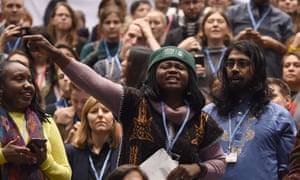Extract from The Guardian
Slow progress on 2015 Paris agreement comes as scientists warn of need to get on track
Negotiators at the climate conference in Poland have inched closer to an outcome, as the official deadline for finishing a deal ran out.
The conference was meant to approve a rulebook which would govern how nations put into action the goals set in the landmark Paris agreement of 2015, when the world resolved to hold global warming to no more than 2C above pre-industrial levels, with an aspiration to limit temperature rises to no more than 1.5C.
On Friday night, sticking points still remained over how countries should report on and account for their greenhouse gas emissions, and there was little progress on persuading countries to make firm commitments to cut their emissions further than they have already promised. Part of the success of the Paris talks was based on the idea that countries would have taken further steps on emissions by now.
Finance for developing countries to help them cut emissions and adapt to the effects of climate change has also been largely overlooked at this year’s conference, though the World Bank pledged $200bn (£159bn) over five years as its contribution.
Observers at the two-week summit in Poland were frustrated by the
slow progress, which came in sharp contrast to the warnings of
scientists from the Intergovernmental Panel on Climate Change that even
1.5C (34.7F) of warming would cause devastation, with the die-off of
coral reefs and the decline of agriculture over swathes of the planet.The conference was meant to approve a rulebook which would govern how nations put into action the goals set in the landmark Paris agreement of 2015, when the world resolved to hold global warming to no more than 2C above pre-industrial levels, with an aspiration to limit temperature rises to no more than 1.5C.
On Friday night, sticking points still remained over how countries should report on and account for their greenhouse gas emissions, and there was little progress on persuading countries to make firm commitments to cut their emissions further than they have already promised. Part of the success of the Paris talks was based on the idea that countries would have taken further steps on emissions by now.
Finance for developing countries to help them cut emissions and adapt to the effects of climate change has also been largely overlooked at this year’s conference, though the World Bank pledged $200bn (£159bn) over five years as its contribution.

The US, which is withdrawing from the Paris agreement, led a small group of countries – Russia, Saudi Arabia and Kuwait – to oppose a resolution that would have welcomed the IPCC report spelling out the dangers of breaching 1.5C.
By the texts still circulating on Friday, they had succeeded in watering down the wording to a mere “noting” of the report. The difference may seem small, but the stronger wording would have allowed eager countries to force debates and possibly future resolutions on how to incorporate those stark scientific warnings into action.
The EU, the UK, New Zealand, Canada and more than 50 developing countries were in opposition, resolving to focus on a 1.5C limit for their own ambitions on cutting emissions.

But veterans of the annual conferences, held since 1992 in the hope of formulating a global response to climate change adequate to the challenge it represents, maintained that more could be forthcoming as the meetings stretched beyond their 6pm official closing time and looked likely to overrun into Saturday and perhaps Sunday. “It all happens at the end,” one national representative said. “We are not giving up yet.”
Next year’s meeting will be held in Chile – it should have been Brazil, but the incoming president, Jair Bolsonaro, who is hostile to the Paris agreement, withdrew the offer. Costa Rica will also play a role, with some of the anticipatory meetings to be held there.
The UK and Italy have submitted bids to hold the 2020 conference, which will be the biggest since Paris in 2015, as governments will be facing a crunch deadline over their efforts to cut greenhouse gas emissions and their commitments to cut them further by 2030.

No comments:
Post a Comment